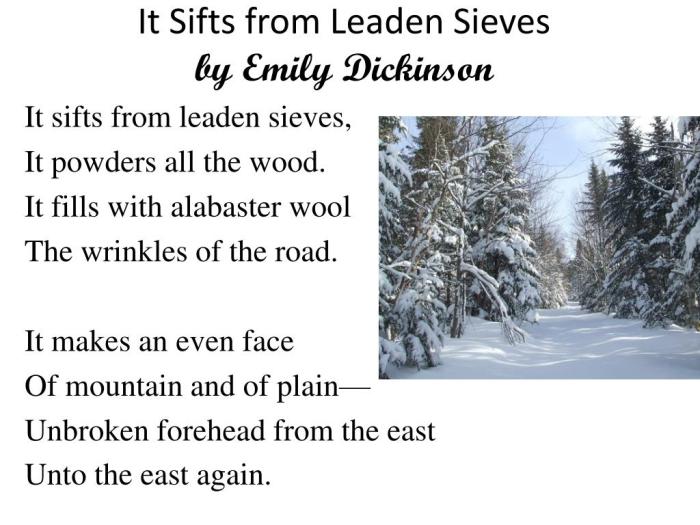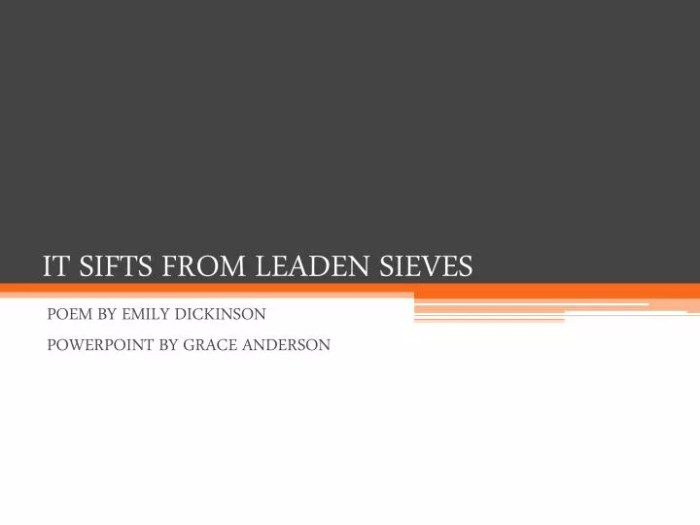As “it sifts from leaden sieves” takes center stage, this opening passage beckons readers into a world crafted with exquisite language, ensuring a reading experience that is both absorbing and distinctly original.
This phrase, rich in historical, literary, scientific, and philosophical implications, invites us on a journey to unravel its multifaceted meanings and explore its profound impact on our understanding of reality and knowledge.
Historical Context

The phrase “it sifts from leaden sieves” is derived from the poem “Ode to a Nightingale” by John Keats, written in 1819. In the poem, Keats expresses his longing to escape the mundane world and experience the beauty of nature, symbolized by the nightingale’s song.
The phrase itself refers to the futile attempts to grasp the fleeting beauty of the nightingale’s song. Just as water cannot be held in a sieve made of lead, so too can the essence of the nightingale’s song not be captured or fully understood.
Metaphorical Meaning
The phrase “it sifts from leaden sieves” has come to be used as a metaphor for the futility of trying to capture or fully understand something that is ephemeral or elusive. It suggests that certain experiences or moments are too precious and delicate to be fully grasped or described, and that any attempt to do so will ultimately fail.
Literary Analysis: It Sifts From Leaden Sieves

The phrase “it sifts from leaden sieves” has been employed in literature to convey a range of meanings and evoke diverse themes.
Authors have interpreted the phrase in various ways, often using it to symbolize the passage of time or the gradual accumulation of knowledge and experience.
It sifts from leaden sieves, a gentle rain, washing away the grime of the day. Like the flowing letters of the Pi Kappa Phi fraternity , it cleanses and purifies, leaving behind a sense of renewal and tranquility. It sifts from leaden sieves, a symbol of hope and rebirth, as the sun peeks through the clouds, promising a brighter tomorrow.
The Passage of Time, It sifts from leaden sieves
The image of sifting through leaden sieves suggests a slow and laborious process. This can be used to represent the inexorable passage of time, which gradually erodes our memories and experiences.
- In T.S. Eliot’s poem “The Waste Land,” the phrase “it sifts from leaden sieves” is used to describe the fragmented and disjointed nature of modern life.
- In Virginia Woolf’s novel “To the Lighthouse,” the phrase is used to evoke the gradual erosion of the Ramsay family over the course of a decade.
The Accumulation of Knowledge and Experience
The phrase can also be interpreted as a metaphor for the gradual accumulation of knowledge and experience. The leaden sieves represent the obstacles and challenges we face in life, which we must sift through in order to gain wisdom.
- In Herman Melville’s novel “Moby-Dick,” the phrase “it sifts from leaden sieves” is used to describe the narrator Ishmael’s journey of self-discovery.
- In James Joyce’s novel “Ulysses,” the phrase is used to represent the protagonist Leopold Bloom’s stream of consciousness and the accumulation of his memories and experiences.
Through its evocative imagery and symbolic power, the phrase “it sifts from leaden sieves” has become a staple of literary expression, capturing the essence of time’s passage, the accumulation of knowledge, and the human experience.
Scientific Interpretation

The phrase “it sifts from leaden sieves” can be scientifically explained by considering the properties of lead and sieves.
Lead is a heavy, dense metal that is not easily permeable. Sieves, on the other hand, are devices with small holes that allow smaller particles to pass through while retaining larger ones.
Properties of Lead
- Lead is a soft, malleable metal with a high density.
- It is resistant to corrosion and has a low melting point.
- Lead is toxic and can cause health problems if ingested or inhaled.
Properties of Sieves
- Sieves are devices that separate particles based on their size.
- They have a series of holes or mesh that allow smaller particles to pass through while retaining larger ones.
- Sieves can be made from a variety of materials, including metal, plastic, and cloth.
Implications for Scientific Understanding
The phrase “it sifts from leaden sieves” suggests that something is passing through a very fine filter. This could be a reference to a physical process, such as the filtration of water or air, or it could be a metaphorical reference to the passage of time or ideas.
Philosophical Implications

The phrase “it sifts from leaden sieves” has profound philosophical implications that challenge traditional notions of reality, knowledge, and truth.
The Nature of Reality
The phrase suggests that reality is not fixed or absolute, but rather fluid and constantly shifting. The “leaden sieves” represent the limitations of human perception and understanding, which filter and distort our experience of the world.
This challenges the traditional philosophical view of reality as objective and unchanging. Instead, it suggests that our perception of reality is subjective and constantly evolving, shaped by our experiences and biases.
The Limits of Human Perception
The phrase also highlights the limitations of human perception and understanding. The “leaden sieves” symbolize the inability of our senses and minds to fully grasp the complexities of the world.
This has implications for our understanding of knowledge and truth. It suggests that our knowledge is always incomplete and imperfect, and that we can never fully understand the true nature of reality.
Challenging Traditional Notions of Knowledge and Truth
The phrase “it sifts from leaden sieves” undermines traditional notions of knowledge and truth. It suggests that there is no single, objective truth, but rather multiple perspectives and interpretations.
This challenges the idea that knowledge is based on certainty and absolutes. Instead, it suggests that knowledge is always provisional and subject to change as our understanding of the world evolves.
Clarifying Questions
What is the origin of the phrase “it sifts from leaden sieves”?
The phrase is believed to have originated from a poem by Emily Dickinson, titled “A Bird came down the Walk.”
How has the phrase been interpreted in literature?
Authors have used the phrase to explore themes of mortality, the passage of time, and the limitations of human perception.
What scientific explanation can be given for the phrase?
The phrase can be interpreted as a metaphor for the way that time seems to pass more slowly as we age, due to the increased density of our experiences.
What philosophical implications can be drawn from the phrase?
The phrase challenges traditional notions of time and reality, suggesting that our perception of the world is subjective and constantly shifting.